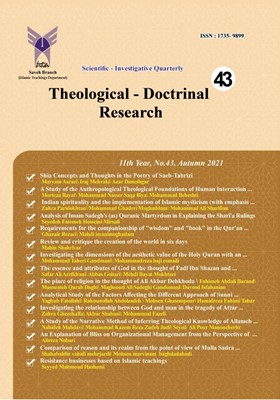An Explanation of Bliss on Organizational Management from the Perspective of Islamic teachings
Subject Areas : زمینههای اعتقادی مسائل اجتماعی و حکومت
1 - Department of Management, Faculty of Humanities, Islamic Azad University, Saveh Branch, Saveh, Iran
Keywords:
Abstract :
We, the Muslims, believe to the God as the only creator and ruler and general governor of the cosmos. We are also believer that his words(in QURAN )is the last sent message to human beings , which is sent to prophet Mohammad as a role model of humankind and receiver of revelation and after him followed by innocent IMAMS to direct people for reaching to the perfectionism and the best way of life. However, concerning the mentioned points by leader of IRAN Ayatollah Khamenei about paying attention to art and social, it is great to note that international re-Searchers in management and social have gained some fantastic results in relation with humankind behavior and environment that is used in organismic and social affairs, whereas the most important parts of these findings are available in general principles of ISLAM that whit applying these aforesaid principles we can provide felicity in both material and spiritual aspects for human beings. Naturally its task of Islamic speculative and researchers. Hence, it would be the trouble of researchers that how to accommodate organismic and social affairs to Islamic principles? How to change the manpower’s conception as the most important part of an organization coincidental with applying Islamic doctrines? In this Article by using of hermeneutics methods , alongside the interpretation of QURAN and academic sources of management, we tried to coordinate the role of human-power and management methods with the philosophy of creation, and meantime we tried to clear the way of accede to commonweal and evince whatever has been found or will be found in new sciences, is intangible in Islamic principles and profoundly attention and enough focus is required to form capacity about this case in people and we can come to conclude that it is the GREATNESS OF ISLAM.
قرآن کریم
نهج البلاغه،ترجمه محمد دشتی،1379،انتشارات پارسیان،قم
تفسیرالمیزان. تالیف سید محمدحسین طباطبایی، ترجمه سید محمدباقر موسویهمدانی، 1382،دفتر انتشارات اسلامی، قم
جعفری تبریزی،محمد تقی،1376،ترجمه و تفسیر نهج البلاغه،دفتر نشر فرهنگ اسلامی،تهران
مکارم شیرازی،ناصر،1391،شرح نهج البلاغه،موسسه تحقیقات و نشر معارف اهل البیت(ع)،اصفهان
مکارم شیرازی،ناصر،1376، مدیریت و فرماندهی در اسلام، مدرسه الامام علی ابن ابیطالب(ع)،قم
نراقی، ملااحمد،1395، معراج السعاده، نشر آبانه، قم
خسروپناه،عبدالحسین،1388،کلام جدید با رویکرد اسلامی،نهاد نمایندگی مقام معظم رهبری،نشر معارف،قم
رحیم پور،فروغ السادات،1385، معاد از دیدگاه امام خمینی(س)-تبیان آثار موضوعی (دفتر سی ام)، موسسه تنظیم و نشر آثار امام خمینی(س)، موسسه چاپ و نشر عروج
مطهری،مرتضی،1375،مجموعه آثار(14)،صدرا،تهران
حسینی خامنه ای،علی، 1388،سایه سار ولایت،ج6، نشر معارف، قم
حسینی خامنهای، سید علی سایت مقام معظم رهبری (مدظله العالی)
مکارم شیرازی،ناصر،1374،تفسیر نمونه، دارالکتب السلامیه، تهران
ابن کثیر دمشقی،اسماعیل بن عمرو،1419 ق، تفسیر القران العظیم، دارالکتب العلمیه،بیروت
فیض کاشانی،ملامحسن،1418ق، الاصفی فی تفسیر القران،مرکز انتشارات دفتر تبلیغات اسلامی،قم
طوسی،محمدبن حسن، التبیان فی تفسیر القرآن، دار احیاء التراث العربی، بیروت
نصری ،عبداله،1382،فلسفه آفرینش، ، دفتر نشر معارف ، قم
ریچارد اسکات ،سازمانها و سازماندهی،ترجمه سیدرضا سیدجوادین، 1391، مروارید، تهران.
حکیمی، محمدرضا و برادان، الحیات،جلد2
عظیم زاده اردبیلی،فائزه،1386،تئوری مدیریت از دیدگاه امام علی(ع)،فصلنامه ندای صادق،شماره20
مشتاق،زینب،1385،خصوصیات یک مدیر لایق و شایسته از دیدگاه اسلام،توسعه مدیریت شماره 72
مصباح یزدی،محمد تفی،1391،پیش نیازهای مدیریت اسلامی، قم: انتشارات موسسه آموزشی و پژوهشی امام خمینی(ره)
مطهری ،مرتضی، فطرت، -سایت ww.mortezamotahari.com
مطهری ،مرتضی،تکامل اجتماعی انسان،–سایت www.mortezamotahari.com.

